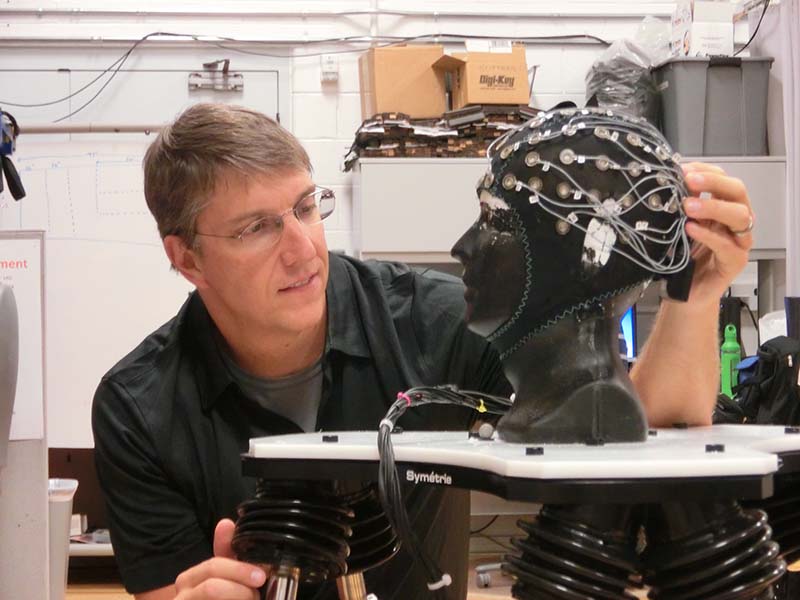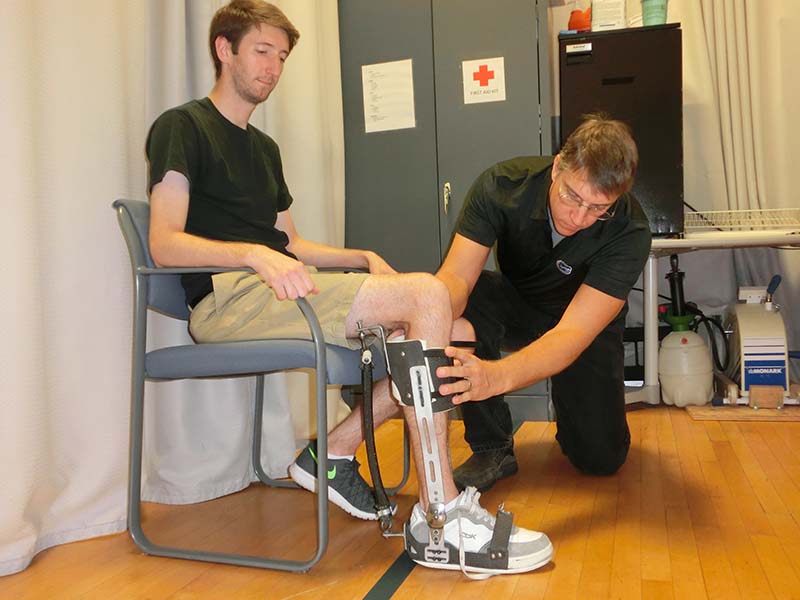The J. Crayton Pruitt Family Department of Biomedical Engineering is proud to welcome Dr. Daniel Ferris as our newest faculty member. Dr. Ferris was hired under the University of Florida’s, “UF Rising to National Preeminence” initiative. In line with UF’s preeminence initiative, the Herbert Wertheim College of Engineering received $1M from the Leo Claire & Robert Adenbaum Foundation to establish the Robert W. Adenbaum Professorship in Engineering Innovation. The gift is intended to bolster the efforts of the Engineering Innovation Institute on top of supporting the vital role the college plays in the larger ecosystem of innovation in the state of Florida. Upon joining the department, Ferris will hold the Robert W. Adenbaum Professorship in Engineering Innovation.
Ferris has been a faculty member and the director of the Human Neuromechanics Laboratory at the University of Michigan since 2001 in biomedical engineering and kinesiology. He has a broad educational background in mathematics, neuroscience, physiology and biomechanics, with specific training and expertise in human locomotion, gait rehabilitation and rehabilitation robotics. He completed his doctoral degree at UC Berkeley in 1998, before working as a postdoctoral scholar at the UCLA Department of Neurology and the University of Washington Department of Electrical Engineering.
 Ferris’ research focuses on the neural control of human locomotion. Specifically, he uses mobile brain imaging, robotic lower limb exoskeletons, and bionic lower limb prostheses to investigate how humans control walking and running and adapt to robotic assistance.
Ferris’ research focuses on the neural control of human locomotion. Specifically, he uses mobile brain imaging, robotic lower limb exoskeletons, and bionic lower limb prostheses to investigate how humans control walking and running and adapt to robotic assistance.
Ferris has developed a collection of robotic lower limb exoskeletons to perturb and assist human movement. He has built exoskeletons for ankle, knee and hip joints, as well as for the whole limb. By perturbing the relationship between neural commands to the muscles and the resulting mechanics, Ferris can identify general strategies that humans use to control their movement.
There are several research groups around the world that have built robotic lower limb exoskeletons for assisting human locomotion. In every case, the changes in gait mechanics, muscle activation, and/or metabolic energetics produced by the exoskeletons have not achieved the intended outcome. The primary reason why the systems have not produced expected results is that there is a great deal about human locomotion physiology that we still do not fully understand. By testing basic hypotheses about how robotic mechanical forces influence the biomechanics, neural control, and energetics of walking and running, Ferris has provided important insight into the most effective ways to add mechanical assistance for locomotion. He has also demonstrated that different control algorithms and exoskeleton designs can independently have profound effects on the motor adaptation of the user. In tests on patients with neurological disabilities, he has shown that patients with incomplete spinal cord injury can benefit from different types of lower limb mechanical assistance.
 The last main area of Ferris’ research is mobile brain imaging. His lab was the first in the world to demonstrate that high-density electroencephalography and independent component analysis can provide functional imaging of brain activity during human locomotion. There is a strong clinical need to quantify human cortical contributions to locomotion control, both for diagnosis and treatment of patients with gait deficiencies.
The last main area of Ferris’ research is mobile brain imaging. His lab was the first in the world to demonstrate that high-density electroencephalography and independent component analysis can provide functional imaging of brain activity during human locomotion. There is a strong clinical need to quantify human cortical contributions to locomotion control, both for diagnosis and treatment of patients with gait deficiencies.
Ferris has received funding from a variety of government agencies, including the NIH, National Science Foundation, Army Research Laboratory, Office of Naval Research and U.S. Army Medical Research Material Command. He also received private funding including the Christopher Reeve Paralysis Foundation, Paralyzed Veterans of American Spinal Cord Research Foundation and the American Heart Foundation. Ferris has secured over $8 million in external funds and he currently receives $1 million external research funds per year.
“Dr. Ferris is an accomplished researcher and outstanding academic. He also brings to the department a unique expertise that is currently not represented. Ferris will collaborate broadly across campus, with mechanical and electric engineering, department of physical therapy and the Center for Movement Disorders and Neurorestoration, to name a few,” said Pruitt Family Professor and Chair, Dr. Christine E. Schmidt.
Ferris will be moving to Gainesville with his wife, Dr. Rachael D. Seidler who will join the department of Applied Physiology & Kinesiology at the UF College of Health & Human Performance, and his two children summer 2017.
